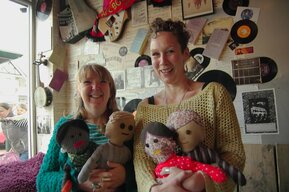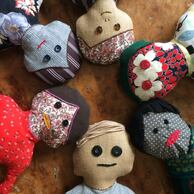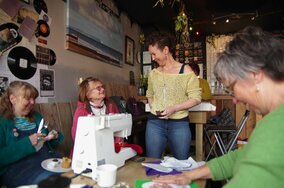sew together stand together
Sew together, Stand together Remembering the textile workers who died at Rana Plaza.
What are we doing and why?
The Rana Plaza building collapse on 24 April 2013 killed 1,134 textile workers - women and men who were working to make clothes for brands including Benetton, Bonmarche, Monsoon Accessorize, Mango, Matalan, Primark, Walmart and more.
(1)
“Sew together, Stand together” aims to make 1,134 UpCycled 'dolls' over the course of year – one doll to represent each person who died at Rana Plaza. At the end of the year we will bring all the dolls together in one place for a public installation.
The project seeks to re-connect us to the people who make the clothes we wear. We will use discarded clothes and textile waste to thoughtfully create each individual doll. We will allow time for the creative process, and space for discussion as we work together.
(2)
As part of the process we ask you to add a label on your doll, with your name, the date and a “made in” location.
Our hope is that by making a doll – either at home or together in a social group – you will be able to make both a mental and physical connection to the work that is undertaken daily in garment factories abroad.
Pattern downloads for the Dolls:
Female Doll Pattern
Male Doll Pattern
Instuctions on how to make up the dolls
What will happen at the end?
Once you have made your doll we would like you to photograph it somewhere relevant (with yourself or not as you prefer) and post it on social media.
Then, in a year’s time – on or near 24th April 2020 – we will undertake an installation of all the dolls, (details and location TBC, but we hope at Parliament Square) and would love you to come in person with your doll, or to post it to us so that it can be part of the final installation.
Raising awareness & seeking change
The Rana Plaza collapse was the deadliest garment factory accident in history, and as the news spread round the world, people were outraged.
There have been some improvements in the years since 2013, particularly to improve safety measures within Bangladesh. However, there is still a long (long) way to go if we want an equitable fashion industry that is safe for all – and for our world.
We need to remember
We need to remember Rana Plaza and the people who died there – and keep pushing for change.
We hope this process will create opportunities for conversation - with people getting together to sew their dolls, and to talk about the issues of fast fashion, sustainability, and the impact of our clothes on people and the environment. You could get together and have a sewing circle with friends or hold a day with your local community – the aim is to spread the message.
We also want to link this project up with other campaigning work already taking place. There are many organisations doing great work in this area – The Circle / Living Wage campaign, Fashion Revolution, Labour behind the Label, and The Clean Clothes Campaign.
As consumers who care, we want greater accountability within the industry – and we want the workers who make our clothes to have fair pay and safe working conditions.
To connect with this project:
Facebook
Instagram
#sewtogetherstandtogether
REFERENCES
1. https://en.wikipedia.org/wiki/2013_Savar_building_collapse
2. https://fashionunited.uk/news/fashion/5-years-on-what-effect-has-rana-plaza-had-on-garment-workers-lives/2018041629133
What are we doing and why?
The Rana Plaza building collapse on 24 April 2013 killed 1,134 textile workers - women and men who were working to make clothes for brands including Benetton, Bonmarche, Monsoon Accessorize, Mango, Matalan, Primark, Walmart and more.
(1)
“Sew together, Stand together” aims to make 1,134 UpCycled 'dolls' over the course of year – one doll to represent each person who died at Rana Plaza. At the end of the year we will bring all the dolls together in one place for a public installation.
The project seeks to re-connect us to the people who make the clothes we wear. We will use discarded clothes and textile waste to thoughtfully create each individual doll. We will allow time for the creative process, and space for discussion as we work together.
(2)
As part of the process we ask you to add a label on your doll, with your name, the date and a “made in” location.
Our hope is that by making a doll – either at home or together in a social group – you will be able to make both a mental and physical connection to the work that is undertaken daily in garment factories abroad.
Pattern downloads for the Dolls:
Female Doll Pattern
Male Doll Pattern
Instuctions on how to make up the dolls
What will happen at the end?
Once you have made your doll we would like you to photograph it somewhere relevant (with yourself or not as you prefer) and post it on social media.
Then, in a year’s time – on or near 24th April 2020 – we will undertake an installation of all the dolls, (details and location TBC, but we hope at Parliament Square) and would love you to come in person with your doll, or to post it to us so that it can be part of the final installation.
Raising awareness & seeking change
The Rana Plaza collapse was the deadliest garment factory accident in history, and as the news spread round the world, people were outraged.
There have been some improvements in the years since 2013, particularly to improve safety measures within Bangladesh. However, there is still a long (long) way to go if we want an equitable fashion industry that is safe for all – and for our world.
We need to remember
We need to remember Rana Plaza and the people who died there – and keep pushing for change.
We hope this process will create opportunities for conversation - with people getting together to sew their dolls, and to talk about the issues of fast fashion, sustainability, and the impact of our clothes on people and the environment. You could get together and have a sewing circle with friends or hold a day with your local community – the aim is to spread the message.
We also want to link this project up with other campaigning work already taking place. There are many organisations doing great work in this area – The Circle / Living Wage campaign, Fashion Revolution, Labour behind the Label, and The Clean Clothes Campaign.
As consumers who care, we want greater accountability within the industry – and we want the workers who make our clothes to have fair pay and safe working conditions.
To connect with this project:
#sewtogetherstandtogether
REFERENCES
1. https://en.wikipedia.org/wiki/2013_Savar_building_collapse
2. https://fashionunited.uk/news/fashion/5-years-on-what-effect-has-rana-plaza-had-on-garment-workers-lives/2018041629133




